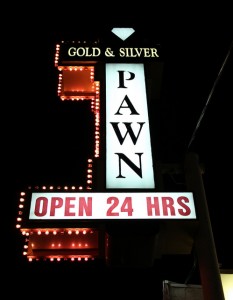
Image: Nick Ares
The History Channel’s “reality” television show Pawn Stars not only reveals interesting facts about eclectic household items, it also demonstrates the value of pawnshops, how this business works, and, in so doing, the nature of trade in general.
The pawnshop owners and their customers negotiate deals that, in every instance, constitute a gain (or at least an expected gain) on the part of both parties.
The show features a family-owned pawn shop in Las Vegas, Nevada, whose customers come in to sell or pawn anything from Civil War memorabilia to video games to custom-made motorcycles. When a customer brings in an antique or an unusual item, the shop owners reach out to experts such as museum curators or specialty retailers, who often explain how they determine the authenticity or value of the objects.
Of course, determining the value of rare items is not an exact science. As the show reveals, pawnshops assume the risk that they will ultimately be unable to sell unclaimed collateral items at a profit—just as all businesses assume the risk that they will be unable to sell or continue selling their products at a profit. Pawn Stars illustrates the basic way in which all businesses work.
In one episode, shop owner Rick Harris explains that he and his “dad started this pawn shop in '88, because [they] wanted to make more money, and lots of it.” While haggling, the shop owners regularly let their customers know that they have to buy items at a price that is low enough for them to make a profit when reselling them.
The show is also quite humorous. When one gentleman accuses Rick of trying to take the food out of his wife’s mouth, for instance, Rick playfully replies, “Yeah, and put it in mine.” The two eventually make a deal, and both walk away having gained from the trade—no food having been taken from anyone’s mouth.
Pawn Stars shows how pawnshops earn their profits by providing a valuable service that people choose to take advantage of. In so doing, as Rick points out, the show beautifully counters Hollywood’s incessant vilification of such businesses.
The show even goes into some fascinating history of the business model. Rick and his father explain that, until the 1950s, “pawnshops were the number-one source of consumer credit in the United States.” And they show that pawnshops remain an important source of credit. For example, one small-business owner pawns his Big Dog Custom Chopper so that he can make payroll. Another man, in the business of antique restoration, pawns a commercial table saw so that he can expand his business.
In addition to being highly entertaining, Pawn Stars illustrates the virtue of negotiating on the basis of one’s values, of trading value for value, and of earning a profit in the process. In short, it illustrates the beauty of capitalism.
Long live pawnshops—and Pawn Stars!
https://www.youtube.com/watch?v=6XhpL9_Lqfc
Related:
- The Exalted Heroism of Alistair MacLean's Novels
- His Dark Materials Trilogy by Philip Pullman - Reviewed by C. A. Wolski
- Review: Mr. Jekyll and Dr. House, by Gena Gorlin


![[TEST] The Objective Standard](https://test.theobjectivestandard.com/wp-content/uploads/2017/10/logo.png)








